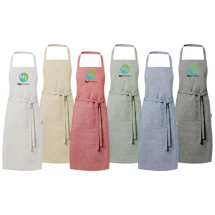Recycled cotton
What is recycled cotton?
Recycled cotton is a sustainable material made from post-industrial and post-consumer cotton waste, including scraps from textile production and used cotton garments. It is widely used in the manufacturing industry and is particularly valued for promotional gifts due to its environmental benefits and versatility. Cotton recycling has a long history, with the process becoming more refined over time to repurpose old textiles and reduce waste. The production process involves collecting, sorting, shredding, cleaning, and spinning the cotton fibers into new yarn, thus reducing the need for virgin cotton and promoting sustainability.
Properties and characteristics of recycled cotton
Recycled cotton retains many of the properties of virgin cotton, making it a valuable material for various applications. It is known for its softness, which provides comfort when used in clothing and textiles. Recycled cotton is also breathable, allowing air to circulate and enhancing comfort. This material is durable, capable of withstanding regular use and washing. Additionally, recycled cotton is hypoallergenic, making it suitable for people with sensitive skin.
Applications of recycled cotton
Recycled cotton is used in a wide range of products due to its versatile nature. Common applications include clothing such as personalised t-shirts, hoodies, and jeans, where comfort and sustainability are highly valued. In home textiles, recycled cotton is found in items like towels, bed linens, and curtains. For promotional products, recycled cotton is often used to create personalized items such as tote bags, caps, and t-shirts, which can be printed with company logos or messages, serving as effective marketing tools that also demonstrate a commitment to sustainability.
Advantages of using recycled cotton in manufacturing
One of the primary advantages of using recycled cotton is its positive environmental impact. By repurposing existing materials, manufacturers can significantly reduce textile waste and decrease the demand for virgin cotton. This helps conserve resources and reduce the overall carbon footprint of production processes. Economically, recycled cotton can be cost-effective, providing benefits without compromising quality. Additionally, using recycled cotton supports the circular economy, promoting more sustainable consumption and production patterns.
Comparison with other materials
Compared to synthetic fibers like polyester, recycled cotton offers better breathability and is less likely to cause skin irritation. While polyester is durable and resistant to wrinkles and shrinking, it lacks the natural comfort and environmental benefits of recycled cotton. In contrast, materials like recycled wool offer excellent insulation but are generally more expensive and less suitable for warm climates. Recycled cotton stands out for its balance of comfort, sustainability, and versatility.
Potential challenges and limitations
Despite its many benefits, recycled cotton does have some challenges. The quality of recycled cotton can vary depending on the source and processing methods, which can affect the consistency and performance of the final product. Additionally, the recycled cotton fibers are often shorter than those of virgin cotton, which can impact the strength and durability of the fabric. There is also the challenge of ensuring sufficient supply of high-quality cotton waste to meet demand.
Comparison of properties: recycled cotton vs. virgin cotton| Property | Recycled Cotton | Virgin Cotton |
|---|---|---|
| Softness | High | High |
| Breathability | High | High |
| Durability | Moderate | High |
| Environmental Impact | Lower (Eco-friendly) | Higher (Less eco-friendly) |
| Cost | Lower | Higher |
What is recycled cotton?
Recycled cotton is a sustainable material made from post-industrial and post-consumer cotton waste, repurposed into new fiber.
What are the benefits of using recycled cotton?
Recycled cotton offers environmental benefits by reducing textile waste and conserving resources. It is also cost-effective and supports sustainable production practices.
What products are commonly made from recycled cotton?
Common products include clothing like t-shirts and jeans, home textiles such as towels and bed linens, and promotional items like tote bags and caps.
How is recycled cotton produced?
The production involves collecting cotton waste, sorting by color and quality, shredding, cleaning, and spinning the fibers into yarn to create new fabric.
What are the challenges of using recycled cotton?
Challenges include variability in quality, shorter fiber length affecting durability, and ensuring a sufficient supply of high-quality cotton waste.








